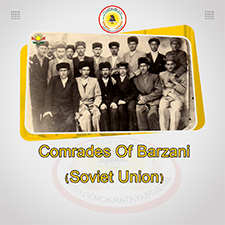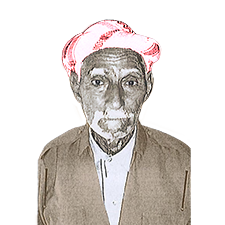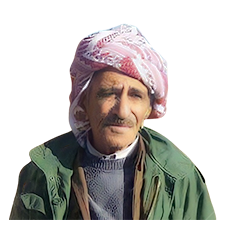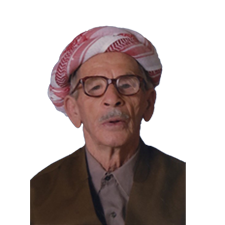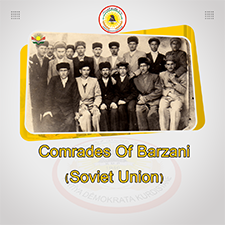Biography:
Babakr Muhammed Zuber was born in 1920 in the village of “Hasne” which was a part of the city of Erbil. He studied in the Soviet Union and got his degree in the agricultural department there. Babakr had a brother named Zuber Muhammed. Also, he married Shukrya Yusif in the Soviet Union. They had a son named Zuber Babakr and a daughter named Hadya. From June 12th, 1963, until December 20th, 1963, Babakr’s wife and children were imprisoned by the Baas Regime because Babakr was Peshmerga and Mustafa Barzani’s comrade.
After Babakr returns from the Soviet Union, he becomes an employee in the agricultural office of Erbil. Because of his role in the “Aylul” revolution, he gets laid off from his work. However, on March 11th, 1971, he returns to his work, and he is later transferred to the agricultural office of Barzan; he works there from 1972 until 1975. Moreover, Babakr spoke Kurdish, Russian, and Persian. He returns to Southern Kurdistan with his family in 1998. Babakr passed away in 2003 and was buried in the village of “Hasne”.
In 1943, before he participated in any revolution, he was part of the army of Iraq. Babakr later deserted the army and contacted the soldiers of the second Barzani revolution and participated in their struggles to reclaim their freedom. Because of his involvement in the revolution, the court of “urfi Sarbazi” took possession of all his belongings on August 19th, 1945. Additionally, on the 11th of October in 1945, after the fall of the second Barzani revolution, Babakr travels to eastern Kurdistan along with his family and Mustafa Barzani. Furthermore, he joins the ranks of the Barzani army in The Republic of Kurdistan on the 31st of March in 1946.
Following the fall of the Kurdistan Democratic Party (KDP) in Mahabad and the return of Barzani from eastern Kurdistan to southern Kurdistan, Babakr participated in the battles of “Naghada” and “Shno” in eastern Kurdistan. Also, he was one of those peshmergas on 19/4/1947 who went through the road of “Khwakurk u Dashti Baraz grawa” on the land of northern Kurdistan to return to “Sherwan” and “Mzuri”. After their return, General Mustafa Barzani on 15/5/1947 in the village of “Argush” conducted a meeting with his comrades and gave them the freedom of whether to stay or go to the Soviet Union. In the meeting, everyone decides to leave and go to the Soviet Union. On the 23rd of May in 1947, Babakr travels with General Mustafa to the Soviet Union and fights in the battles of “Gali Qtur” and the “Mangoor”. After a lot of hardships, on the 18th of June in 1947, he was able to travel to the Soviet Union after passing through the Aras River which was between the borders of Iran and the Soviet Union.
After their arrival at the Soviet Union on the 19th of June in 1947 in the city of “Akhchawan” in the Republic of Azerbaijan, all of the comrades were placed in a community that was surrounded by barbed wire. They were being monitored by the soldiers and were treated like hostages of war when it came to food and clothes. Afterwards, the Soviet government decided that the comrades should be divided into the places of “Aghdam”, “Lachin”, “Ayulax” and “Kalbajar” in the Republic of Azerbaijan. On the 10th of December in 1947, they were transported to a military camp on the lake of “Khazar” in the capital of the Republic of Mahabad “Bakor”. On the 23rd of the same month, they were given military clothes and were trained by the officers of the republic 8 hours a day. On top of that, some of the comrades that were literate in Kurdish would teach the language for 4 hours a day.
After the ill-treatment of “Jaafar Baqrov” with the comrades, on the 29th of August in 1949, Barzani decides to transport his military camp from the republic of Mahabad to a “Chrchuk” community near the city of “Ashkand” which was the capital of Uzbekistan; there they continued their military practices.
In March of 1949, the comrades were divided into the villages of the Soviet Union and farms (where civilians would rent them from the governments and pay them back later). The comrades were working in these places.
Following multiple letters to Stalin by General Barzani, a letter finally reaches Stalin where it talks about the hardships the comrades are going through. Stalin immediately creates a party to investigate the comrades of Barzani; the party comes to the decision that everyone should gather in the city of “Vrivsky”. Everyone travels to the city in November of 1951.
After the July 14, 1958, revolution in Iraq and the return of General Mustafa Barzani, on February 25, 1959, according to both Articles 3 and 7, paragraph (a) of Article 10 and according to Article (11), and based on the amended law No. 19, General Mustafa Barzani and his comrades were granted a general amnesty.
Because of the creation of the Republic of Iraq in 1958 by Abdul Kareem Qasim, Babakr along with his comrades travels back to Kurdistan with the ship “Grozya” through the harbor of “Basra” on the 16th of April in 1959.
Babakr excelled at being a Peshmerga; he participated in the revolutions of “Ayul” and “Gulan”. Additionally, he participated in the battles of “Lolan” and “Alwatan”. Babakr is forced to migrate to Iran after the fall of the “Aylul” revolution. Moreover, he became a resident in “Aghada” in eastern Kurdistan. He retires in 1992 and returns to southern Kurdistan in 1998.
Sources:
- حهمید گهردی، پوختهی مێژوونامه، چاپی یهكهم، (ههولێر - دهزگای چاپ و بڵاوكردنهوهی ئاراس - چاپخانهی وهزارهتی پهروهرده - ٢٠٠٤).
- حیدر فاروق السامرئي، ضیاء جعفر ودوره السیاسي و الاقتصادي في العراق، (لندن – دارالحكمة - ٢٠١٦).
- له یادداشتی فهرماندهی شههید حهسۆ میرخان ژاژۆكی، ٦٢ رۆژ لهگهڵ بارزانی دا، چوونی بارزانییهكان بۆ یهكێتی سۆڤێت، چاپی یهكهم (ههولێر - چاپخانهی رۆشنبیری - ١٩٩٧).
- مسعود بارزانی، بارزانی و بزوتنهوهی رزگاریخوازی كورد ١٩٣١ - ١٩٥٨، (دهۆك - چاپخانهی خهبات - ١٩٩٨).
- نص قرار لجنة العفو العام برد الاعتبار الى شهداء ثورة بارزان، مجلة رزگاری، العدد ٢،٣، المطبعة الرابطة، بغداد، ١ نيسان ١٩٥٩.
- ئەرشیفی دەستەی ئینسکلۆپیدیا، دهقی چاوپێكهوتن لهگهڵ نادر بابهكر محهمهد زوبێر، لە ڕێکەوتی ١٣ی نیسانی ٢٠١٩- پیرمام.





